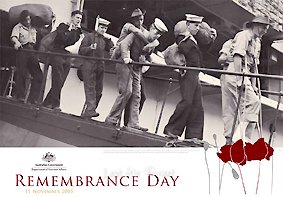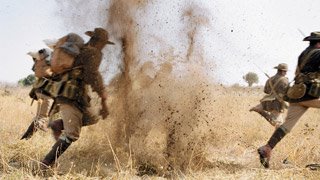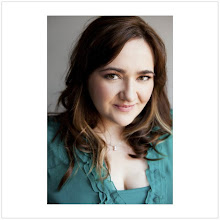Friday, November 11, 2005
Remembrance Day
 For most of my life, Remembrance Day has always seemed like a second-rate ANZAC Day. We didn't even get a day off school - we were only required to be quiet for a minute at 11am - when the siren rang. And that was an achievement in itself - getting a class full of rowdy students to be quiet for 60 seconds - without sniggering or someone saying something profoundly stupid.
For most of my life, Remembrance Day has always seemed like a second-rate ANZAC Day. We didn't even get a day off school - we were only required to be quiet for a minute at 11am - when the siren rang. And that was an achievement in itself - getting a class full of rowdy students to be quiet for 60 seconds - without sniggering or someone saying something profoundly stupid.However, as I progressed through school, read books such as "All Quiet on the Western Front", and spent 12 months studying war as part of my Modern European History class, Remembrance Day slowly began to take on a whole new meaning.
For those who don't know about Remembrance Day, it's a day when we take time out of our lives to remember the end of the First World War, and to remember those who fought, and died in the battle.
From the official site:
"More than 416 000 Australians volunteered for service in World War I. Of these, 324 000 served overseas. More than 60 000 Australians were killed, including 45 000 who died on the Western Front in France and Belgium and more than 8 000 who died on the Gallipoli Peninsula in Turkey."
The tradition of observing 2 minutes silence was established by King George V on 7 November 1919, and has been upheld ever since, as a silent tribute to the soldiers or WW1. It is also tradition to wear a Flanders Poppy as a symbol of rememberance.
When I was younger, I was vaguely aware that one of my great-grandfathers, who died before I was born, fought in WW1. Because of his military service, he is buried in the local RSL Cemetary in Port Lincoln. Often on Remembrance Day and ANZAC Day, we'd go and "visit" his gravesite. That was pretty much all we knew about Jack.

However, a few years ago we were visiting family in Moonta, in South Australia, and decided that we'd go "treasure hunting" in the old house. We discovered a stash of memorabilia - including service medals from WW1. We didn't even know that another of our great-grandfathers had fought in the war. Upon examination of the medals, we noticed that one of them was for service at Gallipoli. That was a surprise, to say the least. We still don't know if he was part of the first landing, or if he arrived later in the campaign, but it's incredible to realise that my great-grandfather was part of the original ANZACS.
Since learning that I have members from both sides of my family involved in the war that November 11 remembers, it's become more than just 2 minutes silence for me. Sadly, some years 11am comes and goes before I realise the time. But, most years I spend the day silently contemplating what these men - young men - endured; what their wives, and familes endured. In today's age of technology, we really have no way of knowing what these people went through - not knowing where their loved ones were, what they were doing, even if they were still alive. Letters took months to arrive. It was unheard of to be able to call your family on the phone. The world was a much bigger place then.
Movies such as "Gallipoli" (filmed in my home town btw!), and "All Quiet on the Western Front" do their best to give us some insight into the realities of war, but they never really get there, although "All Quiet" had a massive impact on me at school. A new film "Gallipoli" by Turkish director Tolga Ornek may give us more of an insight into war - it uses recently discovered video taken in the trenches, photos, letters and diaries of soldiers fighting in the war. I don't think I'll go and see it though. Sadly, there's too much war on television without me going to the movies to see more.
 The new "Gallipoli" was reviewed on "At The Movies" last week. I wanted to include part of the review, as some of what Margaret said is also how I feel:
The new "Gallipoli" was reviewed on "At The Movies" last week. I wanted to include part of the review, as some of what Margaret said is also how I feel:DAVID STRATTON: It's a fascinating film, isn't it, Margaret?
MARGARET POMERANZ: David, I was so upset at the end of it. I mean, and even now, just seeing bits of it, I,(Chokes with emotion) it did just upset me that much, partly because it is so connected with Australian legacy and sense of identity. But also, all those young men dying. And the feeling that we haven't learned anything...
DAVID STRATTON: Well, that's it, yeah. I mean, it's amazing that a Turkish director, young Turkish director, has made such a extraordinary film about this.
MARGARET POMERANZ: I just, I think it's been beautifully done, I think it's a little bit, I'm sorry, I'm so upset just seeing bits of it again. But that's the impact that it had on me, that we haven't learned anything. We're still sending these beautiful young people out to die.
DAVID STRATTON: Perhaps we can just send the politicians out there.
Read the rest of the review HERE
-----------------------------------------
They shall grow not old, as we that are left grow old;
Age shall not weary them, nor the years condemn.
At the going down of the sun and in the morning
We will remember them.
Laurence Binyon
-----------------------------------------
Lest we forget.
Comments:
<< Home
wow, that was great. Your family's war history is really amazing. . Any WWII soldiers as well? Remembrance Day means a lot to me as well, if you wanna know, you can visit my blog. I love your pictures, etc. and the poetry. I'm not very adept with those sorts of things, so all i have is words!
Thanx for posting this. I didn't know as much as Australia's vets. . I'll do more studying on them now. .
Post a Comment
Thanx for posting this. I didn't know as much as Australia's vets. . I'll do more studying on them now. .
<< Home






